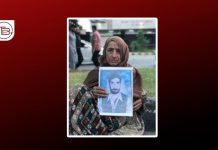Authorities have reportedly suspended internet services in Nushki, Dalbandin, Chagai, and Kharan in Balochistan, days before a planned Baloch Yakjehti Committee (BYC) gathering on January 25 to mark “Baloch Genocide Remembrance Day.”
According to local sources, internet access has been cut off in areas where the BYC conducted awareness campaigns. Some key BYC leaders have also faced criminal charges related to their mobilization efforts.
It is noteworthy that similar tactics were used last year during the “Baloch Raaji Muchi” gathering in Gwadar, where internet disruptions were followed by a heavy-handed crackdown on organizers and participants.
Dr. Mahrang Baloch Denounces ‘Attempt to Silence Voices’
Dr. Mahrang Baloch, the central organizer for the BYC, condemned the internet suspension on X, calling it a “blatant violation of fundamental human rights.”
She expressed concern that a scenario similar to the Gwadar gathering could unfold in Dalbandin, urging human rights organizations to take notice and intervene before any potential use of force against peaceful protestors.
“This approach is not unprecedented,” she wrote, referring to the Baloch National Gathering in Gwadar. “Authorities disabled internet services, followed by a targeted crackdown on the event’s organizers and participants.”
BYC’s Plea to Journalists and Media Outlets
In a letter addressed to Journalists and Media Outlets, the BYC voiced an “urgent call for media attention on the internet shutdown and potential crackdown on the Baloch national gathering in Dalbandin.”
They said that as of January 23, the Pakistani state had preemptively shut down mobile networks and internet services in Dalbandin.
“Balochistan has long endured systematic isolation and media blackouts, obscuring the realities on the ground,” the BYC wrote, referencing July 2024 when mobile and internet were shut down during the “Baloch National Gathering” in Gwadar. “We know too well how such blackouts pave the way for violence.”
The BYC letter described previous peaceful demonstrations that ended with “brutal crackdowns,” including “indiscriminate firing on protesters, enforced disappearances, and suppression of fundamental rights.” They argued these tactics stand in stark defiance of press freedom and the duty of journalism to uncover and report the truth.
“If mourning our dead and remembering atrocities is met with state-enforced silence, then what remains of press freedom?” the statement asked, adding that many journalists have been driven out of Balochistan, transforming the region into a “media black hole.” Ordinary citizens, the group said, have become de facto reporters, risking their lives to document alleged human rights violations.
‘A Time for Journalistic Integrity’
The BYC asked journalists, editors, and media outlets to deploy all skills and resources to “break this cycle of silence” and uncover the situation in Dalbandin.
“This is not about taking sides or advancing propaganda; it is about journalism’s core mission: to seek and report the truth,” they stressed, adding that unreported atrocities breed impunity while silence erodes the foundations of democracy.
“In the name of integrity, objectivity, and public interest,” the BYC urged media to cover the upcoming event on January 25. They believe coverage will not only amplify voices the state aims to silence but also act as a safeguard against further oppression.
Solidarity Campaign on Social Media
In another recent post on X, the BYC announced a “Solidarity Campaign” on social media aimed at opposing any potential crackdown and further internet disruptions.
The group asked supporters to use the hashtag #ISupportBalochNationalGathering and join online from 8:00 PM to 12:00 AM on January 23, urging citizens “from all walks of life” to voice concerns about possible measures taken against the Dalbandin gathering.
No official response from Pakistani authorities was immediately available regarding the reported internet shutdown or the BYC’s allegations of a planned crackdown.






























